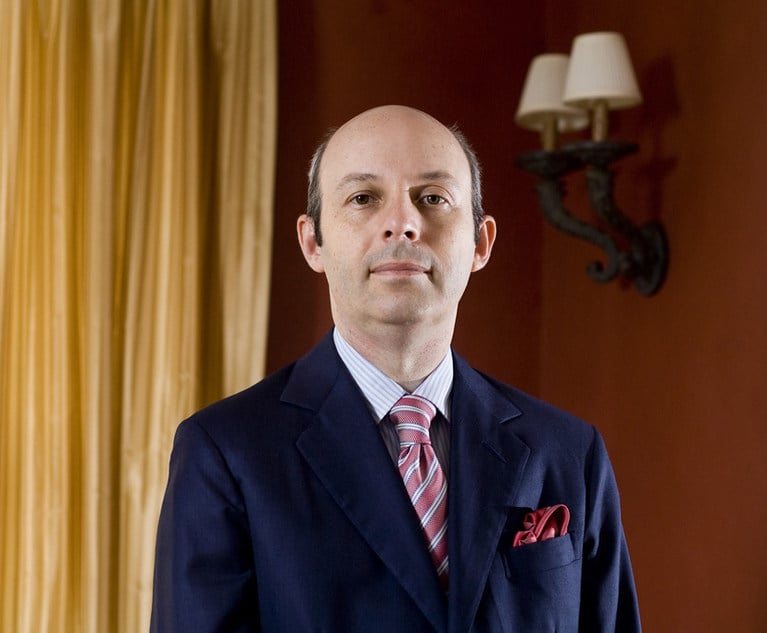 Judge Elizabeth Scherer participates in a sidebar discussion via headset during jury selection in the penalty phase of the trial of Marjory Stoneman Douglas High School shooter Nikolas Cruz at the Broward County Courthouse in Fort Lauderdale on Tuesday, June 28, 2022. Cruz previously plead guilty to all 17 counts of premeditated murder and 17 counts of attempted murder in the 2018 shootings. Photo: Amy Beth Bennett/South Florida Sun Sentinel via AP, Pool.
Judge Elizabeth Scherer participates in a sidebar discussion via headset during jury selection in the penalty phase of the trial of Marjory Stoneman Douglas High School shooter Nikolas Cruz at the Broward County Courthouse in Fort Lauderdale on Tuesday, June 28, 2022. Cruz previously plead guilty to all 17 counts of premeditated murder and 17 counts of attempted murder in the 2018 shootings. Photo: Amy Beth Bennett/South Florida Sun Sentinel via AP, Pool. Jury Is Chosen to Decide Florida School Shooter's Sentence
The panel will have a task never faced by a U.S. jury — no American mass shooter who killed at least 17 people has ever made it to trial.
June 29, 2022 at 10:53 AM
4 minute read
A jury of seven men and five women was tentatively chosen Tuesday for a penalty trial to decide whether Florida school shooter Nikolas Cruz should be sentenced to death or get life in prison for the 2018 attack, capping a nearly three-month winnowing process that began with 1,800 candidates.
The jurors were picked from a final group of 53 candidates by prosecutors and defense attorneys. Those chosen survived three rounds of questioning that began on April 4 and dragged on through numerous delays caused by illnesses and other factors. Eight of 10 alternates were selected before Circuit Judge Elizabeth Scherer adjourned late Tuesday.
The jury will be finalized Wednesday. Both sides still have peremptory challenges that could change the main panel's final makeup — the defense has two and the prosecution has six.
The jury will decide whether Cruz, 23, receives the death sentence or life in prison without parole for the murders of 14 students and three staff members at Parkland's Marjory Stoneman Douglas High School on Feb. 14, 2018. Opening statements, originally expected in May, are now scheduled for July 18.
Cruz pleaded guilty in October to those murders and 17 counts of attempted murder, so the jurors will only decide his punishment. They must be unanimous for Cruz to get the death penalty — if at least one votes for life, that will be Cruz's sentence.
The jurors currently on the main panel are two banking executives and two technology workers, a probation officer, a human resources professional and a Walmart store stock supervisor. Also included are a librarian, a medical claims adjuster, a legal assistant, a customs officer and a retired insurance executive. The defense used a late peremptory challenge as alternates were being chosen to remove a retired health care executive who had originally been seated on the main panel.
At least five currently seated are gun owners.
The panel will have a task never faced by a U.S. jury — no American mass shooter who killed at least 17 people has ever made it to trial. Nine others died during or immediately after their shooting attacks, killed either by police or themselves. The suspect in the 2019 slaying of 23 at a Walmart store in El Paso, Texas, is awaiting trial.
In the first phase of jury selection, the prospective panelists were simply asked if their employment and life circumstances would allow them to serve the four months the trial is expected to last. About 80% were eliminated because their employers wouldn't pay them, they are self-employed, or they had school obligations or vacations planned.
In the second phase, the 300 remaining panelists were asked their opinions on the death penalty and whether they could be fair to Cruz. Finally, about 85 were asked about their lives and work histories, whether they could stomach seeing gruesome crime scene and autopsy photos and even if they play violent video games and believe white people have advantages in society not available to racial minorities.
The selection process was upended several times. One day, the sheriff's deputies who guard the courtroom thought some potential jurors were about to attack Cruz and pulled him to safety as they quickly removed the threatening panelists. On another day, Scherer had to dismiss a group of potential jurors because one wore a T-shirt referencing the shooting that supported the victims and survivors. Selection also was delayed for two weeks when lead defense attorney Melisa McNeill contracted COVID-19.
The jurors will be exposed to graphic evidence, including crime scene and autopsy photos and tour the three-story classroom building where Cruz methodically stalked the halls, shooting at anyone in front of him and into classrooms. It has not been cleaned since the shooting and remains bloodstained and bullet-pocked, with Valentine's Day gifts strewn about.
NOT FOR REPRINT
© 2025 ALM Global, LLC, All Rights Reserved. Request academic re-use from www.copyright.com. All other uses, submit a request to [email protected]. For more information visit Asset & Logo Licensing.
You Might Like
View All
US Judge Cannon Blocks DOJ From Releasing Final Report in Trump Documents Probe
3 minute read
SCOTUSblog Co-Founder Tom Goldstein Misused Law Firm Funds, According to Federal Indictment
2 minute read
Automaker Pleads Guilty and Agrees to $1.6 Billion in Payouts

Read the Document: DOJ Releases Ex-Special Counsel's Report Explaining Trump Prosecutions
3 minute readTrending Stories
- 1Ex-Prosecutor’s Trial Ends as Judge Throws Out Her Felony Indictment in Ahmaud Arbery Death Case
- 2Conversation Catalyst: Transforming Professional Advancement Through Strategic Dialogue
- 3Trump Taps McKinsey CLO Pierre Gentin for Commerce Department GC
- 4Critical Mass With Law.com's Amanda Bronstad: 700+ Residents Near Ohio Derailment File New Suit, Is the FAA to Blame For Last Month's Air Disasters?
- 5Law Journal Column on Marital Residence Sales in Pending Divorces Puts 'Misplaced' Reliance on Two Cases
Who Got The Work
J. Brugh Lower of Gibbons has entered an appearance for industrial equipment supplier Devco Corporation in a pending trademark infringement lawsuit. The suit, accusing the defendant of selling knock-off Graco products, was filed Dec. 18 in New Jersey District Court by Rivkin Radler on behalf of Graco Inc. and Graco Minnesota. The case, assigned to U.S. District Judge Zahid N. Quraishi, is 3:24-cv-11294, Graco Inc. et al v. Devco Corporation.
Who Got The Work
Rebecca Maller-Stein and Kent A. Yalowitz of Arnold & Porter Kaye Scholer have entered their appearances for Hanaco Venture Capital and its executives, Lior Prosor and David Frankel, in a pending securities lawsuit. The action, filed on Dec. 24 in New York Southern District Court by Zell, Aron & Co. on behalf of Goldeneye Advisors, accuses the defendants of negligently and fraudulently managing the plaintiff's $1 million investment. The case, assigned to U.S. District Judge Vernon S. Broderick, is 1:24-cv-09918, Goldeneye Advisors, LLC v. Hanaco Venture Capital, Ltd. et al.
Who Got The Work
Attorneys from A&O Shearman has stepped in as defense counsel for Toronto-Dominion Bank and other defendants in a pending securities class action. The suit, filed Dec. 11 in New York Southern District Court by Bleichmar Fonti & Auld, accuses the defendants of concealing the bank's 'pervasive' deficiencies in regards to its compliance with the Bank Secrecy Act and the quality of its anti-money laundering controls. The case, assigned to U.S. District Judge Arun Subramanian, is 1:24-cv-09445, Gonzalez v. The Toronto-Dominion Bank et al.
Who Got The Work
Crown Castle International, a Pennsylvania company providing shared communications infrastructure, has turned to Luke D. Wolf of Gordon Rees Scully Mansukhani to fend off a pending breach-of-contract lawsuit. The court action, filed Nov. 25 in Michigan Eastern District Court by Hooper Hathaway PC on behalf of The Town Residences LLC, accuses Crown Castle of failing to transfer approximately $30,000 in utility payments from T-Mobile in breach of a roof-top lease and assignment agreement. The case, assigned to U.S. District Judge Susan K. Declercq, is 2:24-cv-13131, The Town Residences LLC v. T-Mobile US, Inc. et al.
Who Got The Work
Wilfred P. Coronato and Daniel M. Schwartz of McCarter & English have stepped in as defense counsel to Electrolux Home Products Inc. in a pending product liability lawsuit. The court action, filed Nov. 26 in New York Eastern District Court by Poulos Lopiccolo PC and Nagel Rice LLP on behalf of David Stern, alleges that the defendant's refrigerators’ drawers and shelving repeatedly break and fall apart within months after purchase. The case, assigned to U.S. District Judge Joan M. Azrack, is 2:24-cv-08204, Stern v. Electrolux Home Products, Inc.
Featured Firms
Law Offices of Gary Martin Hays & Associates, P.C.
(470) 294-1674
Law Offices of Mark E. Salomone
(857) 444-6468
Smith & Hassler
(713) 739-1250






